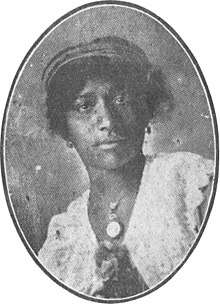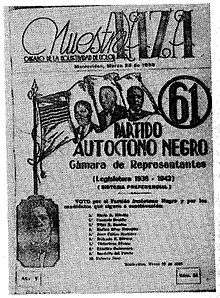María Esperanza Barrios
María Esperanza Barrios (18 December 1892 – 2 October 1932)[1] was an Uruguayan journalist and writer. She notably co-founded Nuestra Raza, a long-running periodical catering to Uruguay's Afro-Latin population.
María Esperanza Barrios | |
|---|---|
 | |
| Born | 1892 |
| Died | 1932 |
| Occupation | Journalist, writer |
| Nationality | Uruguayan |
| Education | Self-educated |
Biography

Barrios was born in 1892. She was the sister to the influential journalist and poet Pilar Barrios, whom had founded a paper titled La Verdad in 1911.[2] Maria worked as a correspondent for the paper until 1914, before going on to co-found the periodical Nuesta Raza with her brother in 1917.[2][3] The magazine was published in San Carlos and it continued to publish for ten years when the editor had to announce that it was to cease publication. The paper blamed its end on apathy and lack of results. Nuesta Raza was later cited as being important tool for advocating civil rights reforms in Uruguay.[3] Similarly, Barrios was noted for her interest in art and has been cited as being a precursor to the black feminist movement.[4]
References
- Our Race (Nuesta Raza). Year 1, No. 3, October 1933. Page 3. "María E. Barrios" Carlos Rodríguez Pintos.
- Lewis, Marvin A. (2003). Afro-Uruguayan Literature: Post-colonial Perspectives. Bucknell University Press. ISBN 9780838755501.
- Appiah, Anthony; Gates, Henry Louis (2005). Africana: The Encyclopedia of the African and African American Experience. Oxford University Press. ISBN 9780195170559.
- Counterpublics and Aesthetics: Afro-Hispanic and Belizean Women Writers. Melva M. Persico. University of Miami Press. p. 88